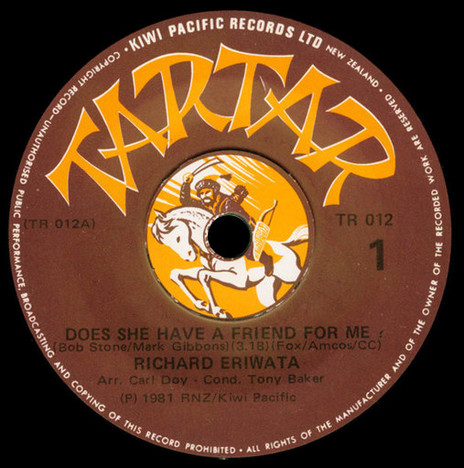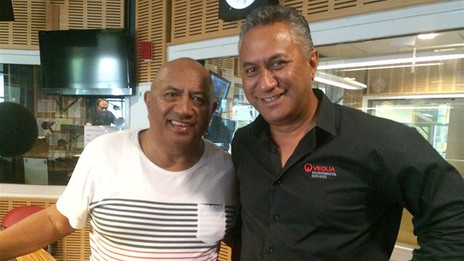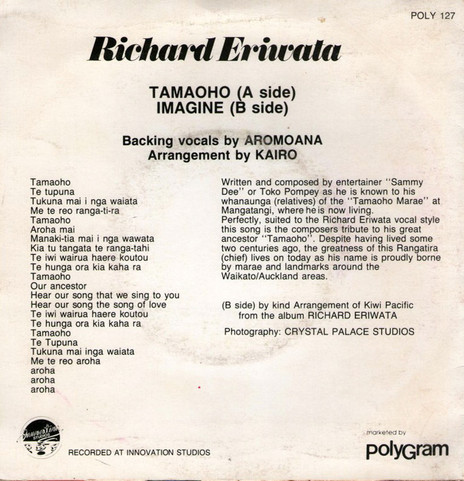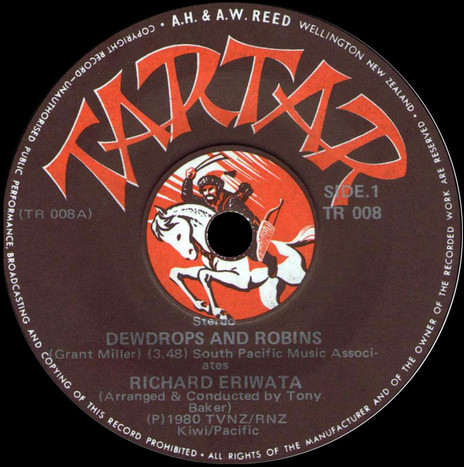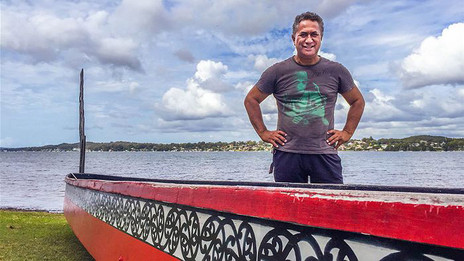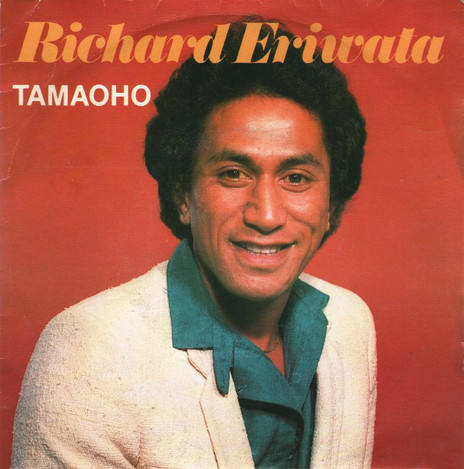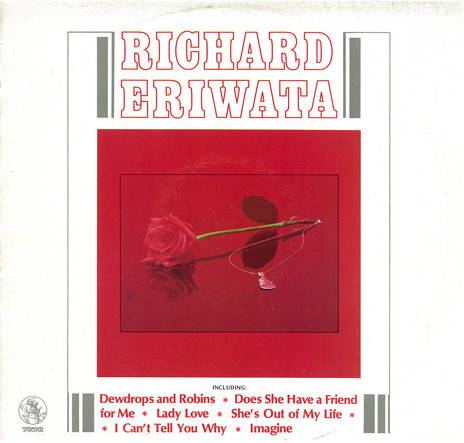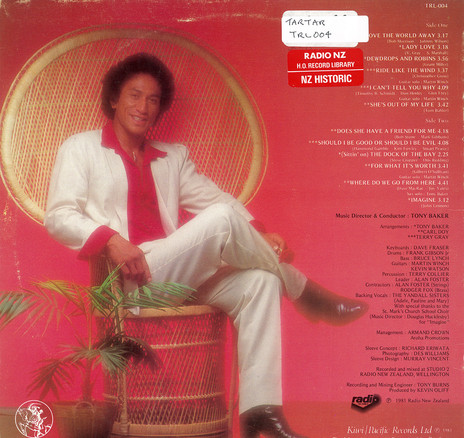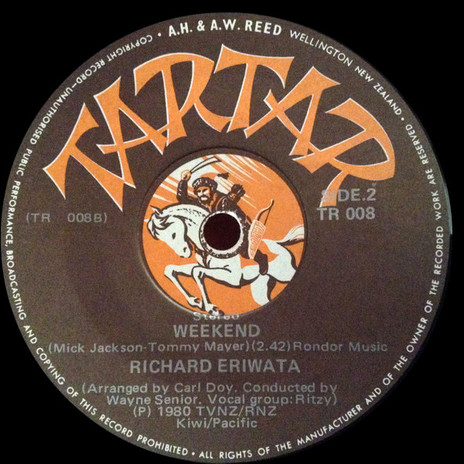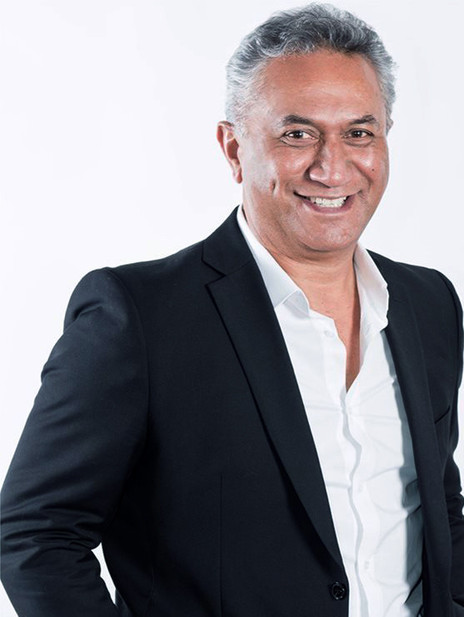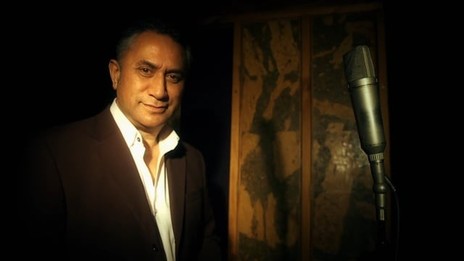He remained onstage, wowed the audience and came in second. Fewer than 10 years later, Eriwata was in demand around the country, had released his own album and had his own TV variety show. The song Eriwata performed at the 1980 Song For The Pacific Contest went down so well it was released as a single.
In the same prisoner-perspective vein as the country standard ‘Green, Green Grass Of Home’, Merle Haggard’s ‘Sing Me Back Home’ and Chapta’s ‘Say A Prayer’, Eriwata’s ‘Dewdrops And Robins’ ran almost daily on television and struck a chord with provincial New Zealand.
Now based in Australia, he is still performing and loving it. “Music and entertainment are in my blood and will stay that way for many years to come hopefully,” he said.
“One of the greatest thrills of my career is seeing my children succeed in music. It’s in our family blood too.” Eriwata’s son Sam is a singer and songwriter with reggae band Sons Of Zion, whose ‘Drift Away’ was one of 2018’s most-played local songs.
The youngest of 14 children, Richard Eriwata was born Winara Wi Parata Eriwata in the small town of Mangakino in 1954. His mother Hohipera also named him after the doctor who delivered him, Dr Ellis Dick, and enrolled him in school as Ellis Dick Eriwata. His family knew him as Dicky. Later when he got serious about singing he changed his name by deed poll to Richard Winara Eriwata.
When Richard was eight, the Eriwata family moved to Auckland. His father, Tauheke Eriwata, worked as a skilled labourer at the Devonport Naval Base. Besides his father’s penchant for playing Māori songs on the ukulele and his mother’s taste in classical music, the house was often jumping to the sounds of his sisters’ rock and roll and jive.
As a boy, Eriwata became aware of the power and magnetism of rock and roll, albeit now a toned-down version, when he saw Elvis Presley in GI Blues at the cinema. He had a vision of himself before a crowd singing as he listened to Presley’s ‘Hound Dog’ on his father’s wireless radiogram. While at Northcote College, he was influenced by the big voices of ballad singers Tom Jones and Engelbert Humperdinck.
Seeing Bunny Walters perform at a local sports club was like “switching a light on” for Eriwata.
Taking on an apprenticeship as a fitter and turner in 1972, Eriwata found himself singing around the workshop. He had shown no interest in singing until then. It was almost as if a light switched on when he witnessed a Bunny Walters floorshow at a local sports club. He told the NZ Herald in 1980, “I wanted to get up there and do it, and I was sure I could. I just needed a push.”
During a holiday at his brother’s in Nelson in January 1973, Eriwata persuaded his brother to enter the annual Mardi Gras Talent Quest as a duo. When the MC introduced them, his brother turned to Eriwata and said, “You’re on your own.” But he only knew half of the chosen song.
While the crowd started clapping and the band began to play, the youngest Eriwata’s first instinct was to run. “The odds were against me,” he said. “Singing the same verse four times sounded ridiculous, but it was the best decision I ever made. I took the risk, the crowd loved it and I came second, winning $50 in the process!”
He went on to win a number of big talent quests in the mid-1970s before forming three-piece band BBD playing clubs, functions and the Auckland winery circuit. In 1978 he fronted nine-piece funk and R&B outfit Atlantikk, doing covers of acts such as Earth, Wind and Fire, The Commodores, Average White Band and Steely Dan, and packing out Caspers in Otahuhu three nights a week.
Eriwata fine-tuned his craft as a singer and entertainer as Atlantikk backed the cream of New Zealand cabaret artists, among them Billy T. James, Bunny Walters, Frankie Rowles, Ken Lemon and Jodi Vaughan. The band also ventured around the North Island taking in Napier, Gisborne, Hamilton, Tokoroa and other locales, but Eriwata wanted more.
A solo career wasn’t considered until towards the end of 1979 when promoter Armand Crown saw Eriwata in action at his regular musicians’ night at Cleopatra’s in Panmure. Eriwata pulled out all the stops in front of the Tuhi-Tama Band featuring guitarists Tuhi Timoti and Tama Renata and singers Josie Rika and Erana Clark.
A deal was struck between Crown and Eriwata in the middle of a musicians’ rugby match for Eriwata to perform his first cabaret show at the Peppermill Cabaret in downtown Auckland. The show was a hit and Crown became Eriwata’s full-time manager.
Crown had a master plan to get Eriwata to the top of the national music and entertainment industry within six months. He set up big-time auditions and opening slots, flying the singer around the country for guest spots on the same circuit as Billy T. James.
In 1980, Eriwata successfully auditioned for a new TV variety show and was thrust into the living rooms of New Zealand as one of the “new” faces on 12 Bar Rhythm ’N Shoes. The programme featured song-and-dance routines and even contained an old face from the Auckland club scene in the form of Classic Affair bass guitarist Reg Ruka. But Richard Eriwata was its breakout star.
Eriwata was the breakout star of the 1980 TV variety show, ‘12 Bar Rhythm ’N Shoes’.
Other projects included an acting role in a three-week season in stage play Songs To The Judges at the Maidment Theatre, working with and learning from veteran actresses Hemi Rapata and Margaret Blay and playwright and director Mervyn Thompson. Eriwata also scored the support for Australia’s Marcia Hines.
He was in high demand around the country and was invited to sing Blenheim songwriter Grant Miller’s ‘Dewdrops And Robins’ in the Song For The Pacific Contest. It was released as a single on the Tartar label, but perhaps due to TVNZ using the clip as filler almost nightly failed to crack the Top 40.
The album Richard Eriwata was released on Tartar in 1981. Recorded at Radio New Zealand in Wellington and produced by RNZ's Kevin Oliff, session players included The Yandall Sisters, Bruce Lynch, Dave Fraser, Rodger Fox, Martin Winch and Frank Gibson Jr.
The LP contained an eclectic selection of material brought together by Eriwata to showcase his versatility on numbers as diverse as John Lennon’s ‘Imagine’, Michael Jackson’s ‘She’s Out Of My Life’, the Eagles’ ‘I Can’t Tell You Why’, Buffalo Springfield’s ‘For What It’s Worth’ and even Auckland blues stalwart Hammond Gamble’s ‘Should I Be Good Or Should I Be Evil’.
Accolades followed when Eriwata was named 1981 rising star at the NEOA Awards, most promising male vocalist at that year’s New Zealand recording industry awards and male performer and record of the year at the Countrywide Building Society Entertainment Awards.
He performed for the Queen at the 1981 Royal Command Performance and the single ‘Tamaoho’ was released on Polydor in 1982; a tribute to the so-named ancestor of songwriter Toko Pompey, also known by his stage name Sammy Dee.
TVNZ noticed the potential in Eriwata and gave him his own series The Richard Eriwata Show, in which one ongoing skit involved a character he created called Wonder Māori. The musicians on the show featured core members of club band Cairo – guitarist Richard Anaru, drummer Kimi Tupaea and Ernie Semu on keys – as well as saxophonist Walter Bianco and percussionist Peter Morgan. Yet to go on to their own stellar careers, Moana Maniapoto and Annie Crummer were among the backing singers. Crummer even had her own weekly guest spot.
While working on the TV show Eriwata settled down with his family. Later in the decade he returned to sing on variety show With A Bucket On Your Head and the official 1988 Telethon song ‘Love Can Find A Way’ with former 12 Bar Rhythm ’N Shoes co-star Suzanne Lee.
Although continuing to sing, Eriwata was realistic about providing for his new family and worked full-time in sales as a business development manager. In 2010, he moved to Australia as a senior sales consultant selling and marketing to the mining industry.
Eriwata is now living happily with his fiancee Lisa on Lake Macquarie, NSW. With four kids (Juanita, Nathan, Samuel and Selina) and 10 grandchildren, he says life is “very busy now with trying to keep up with them all but it’s great!”
In 2015 he joined forces with another expat, popular club entertainer Peter Paki, in a Tom Jones (Paki) and Engelbert Humperdinck (Eriwata) tribute show that proved a huge success and has since played in clubs in New South Wales and Queensland.
